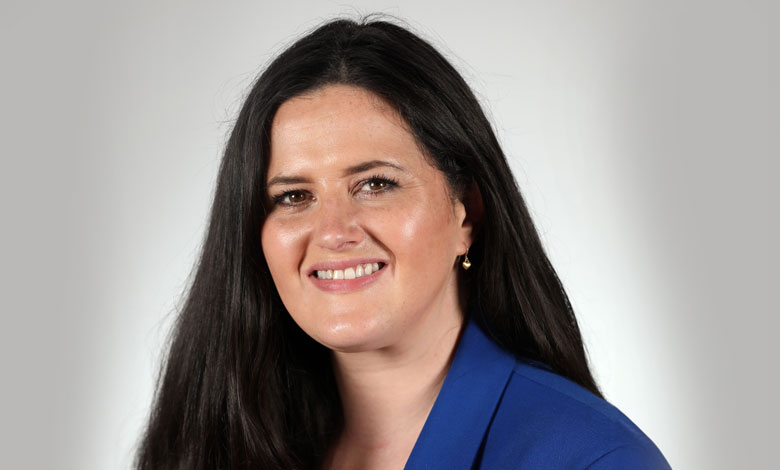A decade of independence: Claire Sugden MLA

Northern Ireland’s most high-profile independent MLA, Claire Sugden, talks to David Whelan about her chance political journey, her experience within the Executive, and her political ambitions.
In January 2022, Claire Sugden made history by becoming the first independent to be elected to the Northern Ireland Assembly three times. An MLA for over a decade, the uniqueness of her political career is unmatched.
Sugden was catapulted into electoral politics at the age of 27 following the death of her mentor, boss, and friend, David McClarty in 2014. That she has subsequently witnessed a change of leadership in each of Northern Ireland’s five largest parties indicates the longevity of her service in a political system heavily weighted towards party affiliation.
A representative for East Londonderry, Sugden outlines an intention to stay the course as an MLA so long as her constituents continue to vote for her. However, she is frank in her admission that she has given thought to a career beyond politics when the time comes, and that she harbours aspirations for a role beyond the backbenches of Stormont.
Ironically, those aspirations are in stark contrast to her early career, where, as a politics graduate from Queen’s University Belfast, Sugden’s interest in policy led her to approaching her local MLA, who at the time was a UUP representative, and go on to work as his parliamentary assistant.
The daughter of a prison officer, Sugden says that while politics was a part of daily life, she never aligned with a political party, and David McClarty’s home in the Ulster Unionist Party did not factor in her decision to seek the job.
McClarty’s decision to go independent and then contest the 2011 election as such, removed the support of a party machine, invariably meaning that Sugden was thrust into a more central role, to the extent that she describes McClarty’s win as her first successful election.
Sugden was co-opted to replace McClarty on Coleraine Borough Council in 2013 but recalls the mixture of emotion and grief when she was later informed by the Electoral Office that McClarty had named her as his successor in the Northern Ireland Assembly, just days after his death following a short period of illness in April 2014.
“My unionism is a constitutional preference rather than a cultural prejudice.”
Claire Sugden MLA
Asked about whether the manner in which she entered the Assembly has been fundamental to her decision to remain as an independent, she says: “Yes. To an extent. I wanted to follow on with the type of personal politics that David had, which for me meant independence.
“Having worked for David for five years, we had very similar beliefs. Coming from an older generation, some of his policy ideas might have been a bit more conservative than mine but ultimately our politics was about representation.
“David was a very thoughtful, balanced person which is probably one of the differences of being an independent compared to a political party because you do have that space to consider and take all viewpoints.”
Sugden describes herself as being of the political middle ground, and as someone who sometimes goes right and sometimes goes left, but who ultimately seeks to bring as many people together as possible.
Her electoral success, high profile, and transfer-friendly status has rendered Sugden a candidate coveted by other parties. In 2022, Sugden publicly turned down a formal approach from then-UUP leader Doug Beattie to join the party. She is adamant that she will only join a political party that aligns with the politics she advocates for but is also aware that such an approach could potentially be career-limiting.
“Being an independent is very difficult and has its limits. If I want to have a future in politics, I may need to consider joining a political party, but I could only do so with a party with which I feel comfortable. If that means me having to leave politics, then that is what will happen because integrity is an important part of my politics.”
Unionism
Sugden acknowledges that she is coveted because of her ‘unionist’ tag, but voices a frustration around the portrayal and perception of that label.
“In Northern Ireland we seem to conflate unionism and nationalism with right- and left-wing politics. For me, and for many unionists, the challenge is that there is no existing home for middle ground, left-wing unionism.”
Sugden cites the UUP’s voting history on policies such as religious and sexual education – an area where she believes Northern Ireland must be more progressive on – as contrary to her own thinking.
“I get approached by those parties not because of my left and right views or my socioeconomic outlook, I get approached because I am a unionist,” she states.
“I would question whether the current government departments are conducive to an outcomes-based accountability model.”
Highlighting a common misinterpretation of her political outlook, Sugden says: “My unionism is quite secure. Often people will describe me as a ‘moderate unionist’, I am not, I am a strong unionist, but maybe moderate in some of my other views. My unionism is a constitutional preference rather than a cultural prejudice.”
Suggesting that those who call for an end to ‘orange and green politics’ in Northern Ireland are failing to recognise the constitutional question as a fundamental part of society, Sugden believes that whether people aspire to a united Ireland or for the region to remain in the UK, they should share a desire to see public services improved and “make Northern Ireland work”.
Executive
In May 2016, Sugden was a shock appointment to the Justice portfolio in the Northern Ireland Executive, having only served as an MLA for two years. Given that independent MLAs in the Northern Ireland Assembly do not even qualify to chair standing or select committees offers a sense of the significance of the appointment. With the Alliance Party refusing the justice portfolio, and both the SDLP and the UUP opting to form an opposition, Sugden was given a unique insight in to how the DUP and Sinn Féin share power.
Sugden enjoyed the experience but admits to being frustrated at not being able to complete the mandate, given that the Executive collapsed after just eight months. Ironically, she laments the opportunity that existed for stable governance at the time.
“If you look at the instability of government in Northern Ireland, it largely comes down to the nature of forced coalition. In this instance, however, we had a situation where, as an independent, I did not pose an electoral threat to the two parties in government,” she explains.
“I have no experience of the Executive before or after, but what I do know is that there was surprise at just how well ministers were working together, how invested ministers were in cross-departmental working, and their approach to the outcomes-based accountability model.”
While Sugden accepts that many factors played a part in the collapse of relationships, namely Brexit, RHI, and Martin McGuinness’ illness and death, ultimately, she believes that there was a discomfort among respective electoral bases at how well Sinn Féin and the DUP were working, and cites the main reason for failure as “that it was too successful”.
Since leaving the post, she has been vocal about the level of misogyny and ageism she experienced, but points to a record, even in the short space of time, which she is proud of. Her biggest regret is not being afforded the time to progress to completion work on domestic violence legislation, but she takes solace in the fact that the Domestic Abuse and Civil Proceedings Act came in to force in 2021 under another mandate. Equally she points to direction issued to civil servants prior to the three-year Assembly and Executive hiatus in areas such as stalking, sentencing, and paramilitaries as being paramount to policy being brought forward more laterally.
Asked if it is a position she will consider taking again if the opportunity presents itself, Sugden is emphatic in her response: “Yes.”
Sugden’s potential return to the justice portfolio was mooted ahead of the Assembly and Executive’s return in February 2024, but ultimately the role was retained by Alliance Party Leader Naomi Long MLA. On its return, MLAs had been out of the Assembly chamber for over two years and had their pay cut by the Secretary of State.
Given the instability of devolution, a small number of MLAs chose to quit politics and pursue other careers, while others were hesitant about returning without the guarantee of stability, not least a Programme for Government.
Sugden had no such hesitancy, stating that in a job centred on improving policy and public services, the loss of any time in a mandate serves as a hindrance. Although outlining her frustrations at the obvious limitations of the shortened mandate, she adds: “I am a believer in the Assembly. I think we have significant powers and opportunities to improved things now – whether they are utilised is about whether the right people are elected to drive that change.”
Describing a scenario whereby public servants in Northern Ireland will continue to “fight fires” until the long-standing ambition to transform public services is achieved, she believes that the current structures of governance must be challenged.
“I would question whether the current government departments are conducive to an outcomes-based accountability model,” she says. “For example, if we want better outcomes for children – a remit that spans across education, health, communities, etcetera, then we should have a Department for Children. Realistically, civil servants who have a bottom line and a very specific remit are not going to extend beyond that remit, because it does not not fit their budget. If increasing the current remits is unrealistic, then we must change those remits.”
Independence
Turning to the challenges of independence within the Northern Ireland Assembly, Sugden is acutely aware of her need to prioritise policies and strike a balance between Assembly and constituency business.
Where other parties employ the use of specific spokespeople on particular policy spheres, and councillors at local level, Sugden is a sole voice, something which she admits can be difficult.
On how she prioritises her time, she says: “I am an independent and represent one constituency, which is my priority. If I need to be in my constituency rather than in Stormont then that is what I will do, however, there does have to be a balance because I do take an interest in broader policy areas.”
Explaining that, contrary to popular belief, the recent Assembly hiatus actually meant an increase in workload for MLAs like herself, as they sought to address challenges for their constituents without the normal structures in place, she admits that a level of personal sacrifice is required to effectively do the job which she describes as “a privilege”.
“I have chosen to be an independent and I believe I punch above my weight in terms of what I have achieved and how I represent my constituents. Is that a personal burden? Yes, it is, and I find that particularly so since I have had a child.”
Asked if after over a decade of public service, she sees her long-term career as in politics, she says: “I feel very fortunate doing this job and I will enjoy the ride as long as I am on it. When that is I do not know, but I will stay here as long as people want me.
“The one thing I would say is that I do not really want to be a backbench MLA for the rest of my life.”





